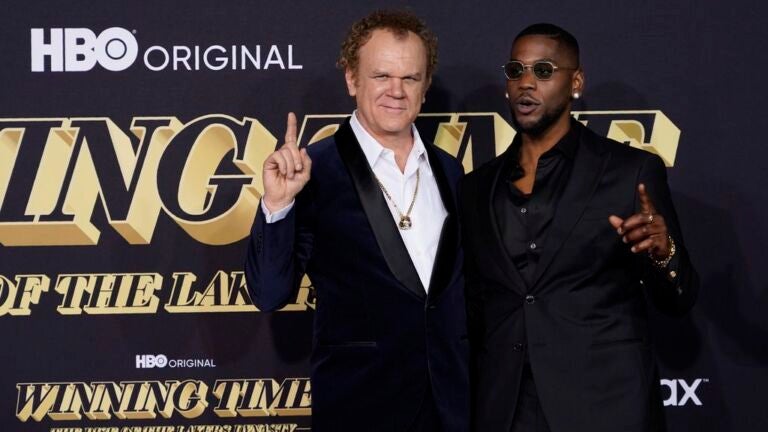
HBO’s ‘Winning Time’ has Hollywood glitter and appeal, but like Tinseltown, not all the stories are true
NBA
The portrayal of Lakers icon Jerry West is the most egregious example, but there are many more.

In his 2011 memoir “West by West: My Charmed, Tormented Life,’’ Jerry West, an NBA figure so iconic that the league’s logo is his silhouette, wrote with stunning candor about how the scars of a nightmarish childhood never faded during adulthood.
“I think most people would agree on this: there are certain events that are important in your life and can do damage to it. Life-changing events,” wrote West, whose older brother died in the Korean War and whose father was abusive. “And I’ve had some of those, and, unfortunately, they happened to me when I was young. But that, perhaps more than anything else, formed much of the crucible of who I am, and almost certainly made me into the determined person and sick competitor that I became, a tormented, defiant figure who carries an angry, emotional chip on his shoulder and has a hole in his heart that nothing can ultimately fill.”
Author Jeff Pearlman reiterated West’s self-reflective words in his superb 2014 book “Showtime: Magic, Kareem, Riley and the Los Angeles Lakers Dynasty of the 1980s,” a meticulous dive into the fast-breaking, fast-living team for whom West was a brilliant executive. “Showtime” is the basis for the new HBO Max series “Winning Time” (the title was changed so as not to be associated with HBO’s rival pay-cable network of the same name), which will air the third of its 10-episode season Sunday.
Pearlman’s book, in which even obscurities such as first-round bust Earl Jones are documented with compelling anecdotes, is rich with drama, humor, and pathos. So is “Winning Time.” But the television product, as wildly entertaining as it is — and it absolutely is that — suffers from wholly unnecessary dramatizations that result in a contorting, if not an outright dismissal, of the truth. Compelling real-life characters, many of which are already family, become cartoon versions of themselves. “Winning Time” is an unnecessary Hollywoodization of what was already the ultimate Hollywood team.
The most egregious example in the entire series is the over-the-top portrayal of West, gentlemanly if hardly afraid of confrontation in real life, as a vulgar, incurable rageaholic who at one point in early episode fires his 1969 Finals MVP award — awarded to him despite the Lakers’ seven-game loss to the Celtics — through a glass window in his Fabulous Forum office. Like so much in “Winning Time,’’ this did not actually happen.
(The series also features more gratuitous nudity than any HBO show since, oh, I don’t know, “Dream On.’’)
“Winning Time” is executive produced by Adam McKay (”The Big Short,’’ “Step Brothers,” “Succession”), and it features his entire repertoire of effective but familiar idiosyncrasies, including quirky chyrons (future Clippers owner Donald Sterling is introduced as “The second-worst Donald of the ‘80s”) and characters frequently breaking the fourth wall (John C. Reilly, who gleefully plays Lakers owner and chief protagonist Jerry Buss, talks to us like he’s the best-life, middle-aged version of Chest Rockwell, Reilly’s “Boogie Nights” character).
The series acknowledges it is a dramatization at the top of the first episode, but dramatization undersells it. The Celtics, for instance, aren’t just positioned as rivals, but particularly sinister villains. When Red Auerbach, played zealously by Lowell native and Celtics fan Michael Chiklis, shows up in the second episode, he enters to the lyrics of The Louvin Brothers’ “Satan is Real: “Satin is real, working in spirit/You can see him and hear him in the world every day …” Chiklis-as-Red does have a line to relish later on, though: “There’s never been a [expletive] leprechaun,’’ he snarls. “It’s me.”
And just wait until Larry Bird shows up for the first appearances of any length in Episode 7. (I’ve watched the screeners for the first eight episodes). At a press conference at Boston Garden with Magic Johnson before the college rivals’ first meeting as pros, he shows up carrying a Budweiser can (an accurate call on his beverage of choice, at least) that he uses as a receptacle for his tobacco spit. This Bird is monosyllabic and dead-eyed, and at one point he leans over, covers up the microphone, and offers a curse-laden vow to Magic about what he’s going to do to him on the court. No, this did not happen either, and the Bird portrayal couldn’t be more annoying to Celtics fans if they had cast Bill Laimbeer in the part rather than Sean Patrick Small.
So what works in “Winning Time”? The cast is even more fabulous than the old Forum, particularly Adrien Brody as Pat Riley, DeVaughn Nixon as his real-life father, Norm Nixon, and newcomer Quincy Isaiah, who aces what would seem an impossible task of capturing Magic’s otherworldly charisma. Everyone seems to be having great fun, and watching them is fun.
But just remember: When something absurd occurs — such as Nixon humiliating Magic at an all-too-on-the-nose white party at Sterling’s mansion — and you catch yourself asking, “Wait did this actually happen?’’ chances are the answer is no. I’d recommend reading Pearlman’s book as an accompaniment to watching the series it inspired. It’s just as entertaining. Better still, it’s the truth.
Get the latest Boston sports news
Receive updates on your favorite Boston teams, straight from our newsroom to your inbox.
